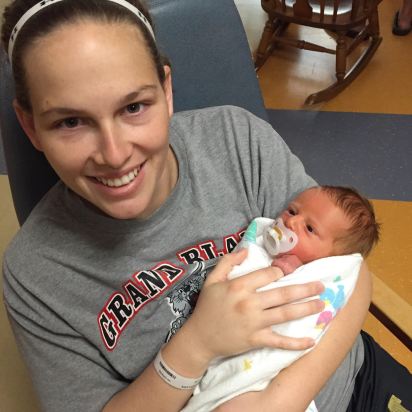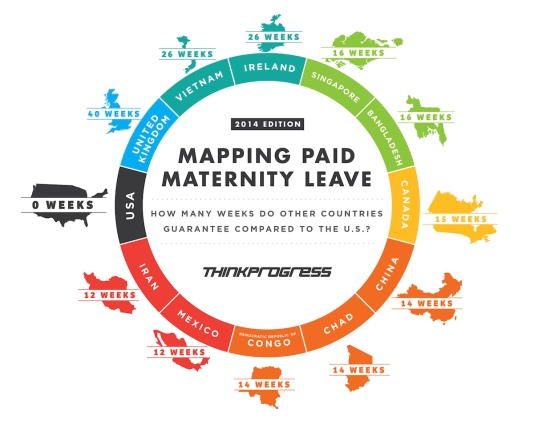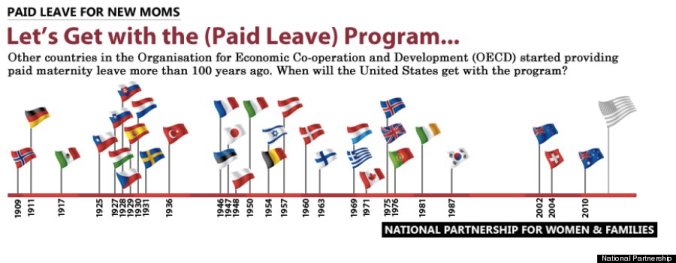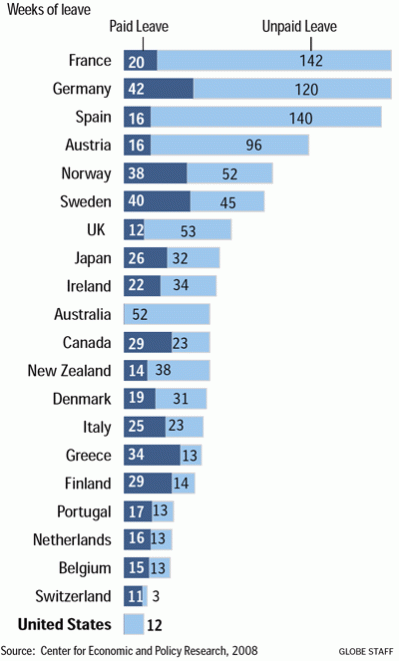Women have worked hard to come a long way, socially speaking, in the United States, but unfortunately we have also taken some steps backwards. Or rather, we were pushed down the back stairwell after fighting to publicly ascend the grand staircase of workplace equality. Women have become a staple in the previously male dominated work force, but have taken certain hits to get there. In fact, most middle class households rely on two incomes. (I will not discuss the gender wage gap in depth at this time, but it irks me considerably. As of November 2015, according to Ivana Kottasova who reported for CNN, the gap is 64% in the United States.) With our fight to gain equality in the work force, which clearly still needs negotiating, somehow women have been discriminated in another way. We have come so far career-wise, but instead of being oppressed professionally, now our personal lives are taking a hit.
It is as if the powers-that-be, if you will, have implied that sure, women can have successful careers, but they are going to have to put their personal lives on the back burner. (To be fair, men also had to do this to a degree, but men don’t have to bear the children, subsequently recover, and nurse the new baby.) If women do choose to have children, the maternity leave they face here in the United States varies based on their employer, but there is no law that protects their job nor mandates that women be paid during that leave.
FMLA (Family and Medical Leave Act) is the only law regarding [unpaid] leave for new mothers in the United States. (The law protects new fathers too, but I will get to paternity leave a little later.) However, there is no legislation that mandates employers give new mothers paid time off. The government has left maternity leave choices in the hands of individual employers. With respect to FMLA, not every new mother qualifies for this protection. The employee (expectant mom/dad) must have been employed with the company for 12 months, s/he must have worked at least 1250 hours prior to the start of FMLA leave, and the employer must employ 50 or more employees within a 75 mile radius of the worksite, according to FindLaw.com. TechRepublic.com claims that 59% of U.S. workers are not protected by FMLA. They also forward that FMLA is contributing to the gender pay gap. In short, FMLA is not enough and it’s not working.

When baby was a newborn.
As you all know, I have been lucky enough to get to stay home with my little guy for almost five months now. What most of you probably don’t know is the reason that this is possible. It’s hard to discuss, but I was laid off due to budget cuts at the end of the last school year. I was eight and a half months pregnant and devastated, but one of my coworkers instantly helped me see the silver lining: I was going to get to stay home with my baby for a lot longer than FMLA would have guaranteed me. With FMLA I would have only been able to spend twelve unpaid weeks with my little guy. And the sad truth is that I would have been damn lucky to get twelve weeks off. I have close friends who were not protected by FMLA, and could only have one or two weeks off to recover and then they were expected back. I cannot imagine having to leave such a tiny baby for any extended amount of time, let alone in the care of someone I barely know, five days a week.
Babies need their mothers. There have been countless studies done and nearly every, single finding is that babies are less stressed physically and emotionally when they are either in their mother’s arms or close by. The initial bonding period is crucial for helping baby feel a sense of security. Mothers and babies need time to figure each other out, in order to bond. Also, mothers who want to, should be able to establish a firm foundation for nursing their child during those tough, first few weeks. Breast feeding is recommended until at least six months old, but many working mothers simply don’t have this choice. I can attest that it takes time and a lot of patience to train baby to nurse properly and consistently. This often means late night feedings, as babies typically nurse every two to three hours. A working mom might not be able to function at her job the next day if she is up all night trying to nurse a squirming baby. And when a family depends on her income, breastfeeding often stops. Of course some women are able to handle this and are given somewhere private to pump at work, but not all employers will or are able to provide this.

In the hospital with baby.
Aside from baby’s benefits in having mom nearby all day and night, there are mom’s benefits. Moms who don’t have to worry about work (or lesson plans, grading, and parent communication in my case) are better able to focus on their new baby’s needs. Moms are better able to enjoy time with their new babies as well. Babies change and grow so much during the first year of their lives. They are born this tiny, helpless being, and by the end of their first year, most babies are walking, babbling, eating solids, honing their fine motor skills, and even have quite a few teeth. They become little, mobile humans in twelve months! This is as close to a miracle as I have ever witnessed. And to rob a mother of witnessing these changes is absolutely criminal. A mother should be able to be on the floor next to her baby, encouraging him the first time he rolls over. A mother should be able to see the grimace on her child’s face when he tries sweet potatoes for the first time. A mother should be spotting her son when he daringly takes his first, wobbly steps. A mother should hear her baby’s first word. A mother should be there, period.
When comparing the U.S.’ maternity leave legislation to other countries worldwide, the evidence is staggering. For a country who likes to think of itself as the leader of the free world, our standing is just sad. We don’t measure up, and as a country that might be the most competitive in the world, you’d think that would be motivation enough to step up our legislation. You’d also think that basic humanity and common sense would be a motivator, but clearly that isn’t the case either. The latest research demonstrates that the U.S. is in last place in the world, when it comes to paid parental leave. The following graphics demonstrate quite clearly just how far behind the United States is when it comes to giving mothers what they need and what they deserve.

Photo: “U.S. Paid Family Leave Versus the Rest of the World, In Two Disturbing Charts” by Adam Peck and Bryce Covert. July 30, 2014. thinkProgress.org/economy/2014/7/30/3465922/paid-family-leave/
Family should come first. Learning how to be a parent and having the time to hone those skills is crucial in establishing a foundation for family unit. Establishing this foundation will inevitably lead to higher chances of your son or daughter being more successful and well adjusted later on in their lives. Feel free to draw your own correlations to youths today and the sad fact that their parents don’t and never have had time to spend with them, due to their demands at work. We need a change, friends. New mothers and fathers absolutely need to spend time with their baby. There are countless benefits for all three parties. Women have worked so hard to be respected in the work force. Why punish them because they want to have children?

How long must we wait? Photo: “Exceptionally Oblivious: The Great American Happiness Myth” by Sarah Jost. March 31, 2014. urchinmovement.com/2014/03/31/exceptionally-oblivious-the-great-american-happiness-myth/
I do not consider myself a politically-minded person, but this issue is being thrown around by some presidential candidates and it’s time to put our pen where our mouth is. President Obama has been working towards and pushing for paid sick days and family leave for all. But he has faced challenges in getting this done. This is NOT a partisan issue. This is an issue of humanity. It’s inhumane to separate new mothers from their babies. And a JOB should never be the reason for this separation. Family is everything. It’s time we start acting like it.

Wow I did not realize the difference. Where i live in Canada, you get a year. Paid. Job is held. Its the law. I am not sure which law exactly protects it, or how it is broken down, some may be under one part of the government funds, another elsewhere. It has been 11 years since I have claimed. However a coworker of mine, a dad took maternity leave last year as his girlfriend wasn’t working. You do get paid leave, it is not your full wage but a %.
This post was educational. Thank you for sharing.
LikeLiked by 1 person
Thank you for the information about Canada! In a perfect world, the U.S. gov. shouldn’t have to step in. American employers should do the right thing and give parental leave to any employee who has had a baby. However, greed trumps basic humanity. The thing that bothers me most is that if we were given a proper amount of time off to be with our children, we would be better employees. We wouldn’t be bitter and angry that we were working instead of being with our new babies. As I said, I am lucky, but so many moms and dads are not. Thanks so much for reading! I really appreciate you powering through a long and not typical post of mine!
LikeLiked by 1 person
Hi, Just dropping by to let you know I nominated you for the Liebster Award.
here’s the link to today’s post (https://practicalbydefault.wordpress.com/2015/12/26/bonus-post-liebster-award-nomination/)
I love your blog and hope more people read it 🙂
Thanks!
LikeLiked by 1 person
Wow thank you so much! I don’t even know what to say! Thank you!!!
LikeLiked by 1 person